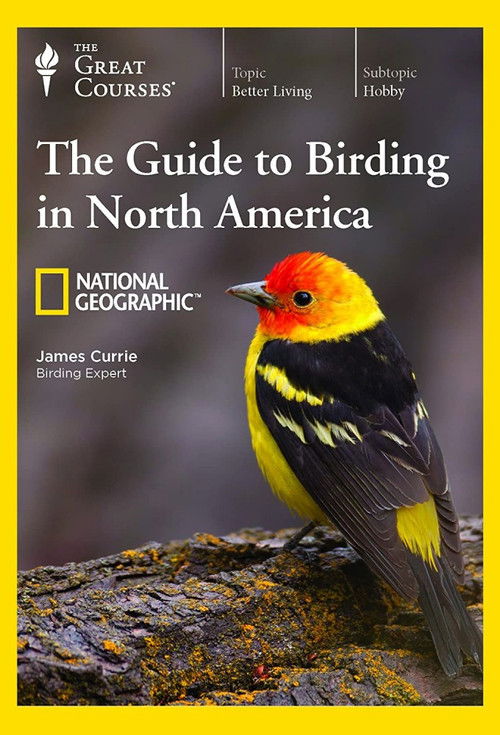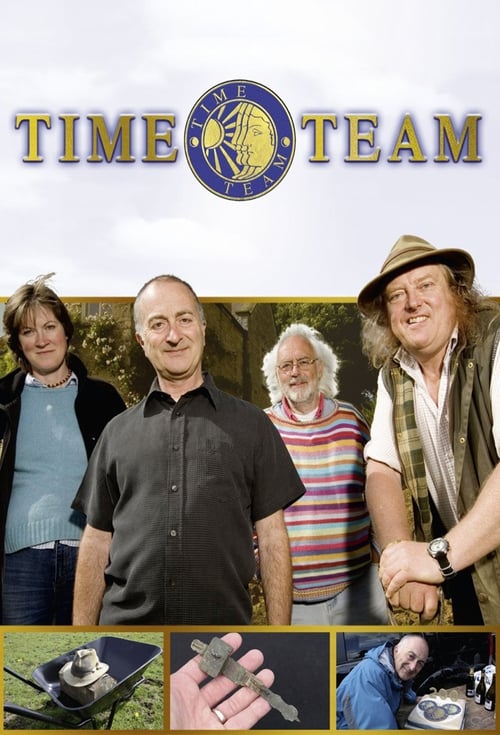
Genres
Networks
The Great Courses
Created By
The National Geographic Guide to Birding in North America
Overview
Birding expert James Currie presents components of birding: - essentials of bird anatomy and taxonomy, and how this knowledge helps the student critically in the field; - how to identify birds, plus related topics such as birding by ear, birding at night, bird behavior, avian migration; - optical equipment for birding, highlighting binoculars and spotting scopes, and how to use them; - the exciting activity of locating, approaching, and observing birds in the field: stealth techniques for tracking and approaching birds; ways to attract birds by mimicking bird calls and predators; and how to bring birds into your own yard or surroundings.
Key Crew
Writer: James Currie
Top Cast
James Currie
Self - Host
Seasons

Season 1 (2017)
No overview available.
24 episodes
Episodes
Episode 1: Birding Basics: Bird Origins and Taxonomy
2017-05-26Begin by delving into the history of birdwatching in the U.S., from the early naturalists of the 18th century to today's highly organized activity. Then look into the origins of birds, and how they are linked evolutionarily to dinosaurs and early reptiles. Finally, explore bird taxonomy, and how their scientific classification aids us in identifying them in the field.
Runtime: 30 minEpisode 2: Basic Bird Anatomy
2017-05-26Investigate the anatomy of birds, and how understanding anatomical features aids us in identification. Then learn about the fascinating range of bird feathers, and their different functions. Observe how understanding the flight patterns of birds helps identify them in the field. Last, compare two common birds, as an exercise in using the knowledge you've learned so far.
Runtime: 30 minEpisode 3: Size, Shape, and Color as Birding Tools
2017-05-26Look first at three physical tools that you can use right away to become a more effective birder. Consider how familiarity with the shape or silhouette of bird families, as well as bird size, aid you in focusing in on exact species. Study the color factors of pigment and keratin, as they produce the dazzling range of bird coloration, and investigate color as an identification tool.
Runtime: 30 minEpisode 4: Bird Distribution, Status, and Endemism
2017-05-26Take account of three further aids for bird identification. See how charting birds' distribution or geographical range provides much useful information about specific species. Grasp the benefits of knowing a bird's status, or abundance vs. rarity, and how status can change. Also study the factor of endemism, where birds are limited to one specific region, and the uses of this information.
Runtime: 30 minEpisode 5: Habitat and Season as Birding Tools
2017-05-26Explore the North American habitats of forest, grasslands, desert, sagebrush, chaparral, and tundra, distinguishing their specific features and the amazing birds that are native to each of these environments. Add to this knowledge by investigating the roles of habitat specialization, the seasons, and migration patterns as they help us in identifying bird species.
Runtime: 30 minEpisode 6: Introduction to Birding Optics
2017-05-26This lecture discusses the core optical tools that aid us in observing birds in the field. Study the parts of a pair of binoculars, and the pros and cons of different types of binoculars. Learn how to use binoculars for birding, highlighting matters such as magnification, field of view, and depth of field. Also take account of spotting scopes, and how they provide detail that binoculars can't.
Runtime: 30 minEpisode 7: Tactics for Better Birding
2017-05-26Today, review a range of methods for attracting birds, in the field and at home. In both places, consider the use of stealth and concealment techniques, for observing while remaining unobserved. Study the remarkable ability of sounds to attract birds, and the use of water, plants, and feeders in your yard. Also learn about important ways to record your observations.
Runtime: 30 minEpisode 8: Using Bird Behavior to Identify Birds
2017-05-26Look into six categories of bird behavior, as they provide vital information for identification. See how individual species are distinguished by typical or unique behavioral traits. Study the distinctive feeding habits of many species, and how we can recognize species from flight and flocking behavior. End by exploring the extraordinary mating and nesting customs of North American birds.
Runtime: 30 minEpisode 9: Understanding Variations in Plumage
2017-05-26Plumage variation in a single bird reveals much useful information. First, take account of plumage differences based on sex, and seasonal plumage changes. Then investigate the remarkable range of age-related plumage variation in birds. Learn how birds molt (shed and replace plumage), and how hybrid species, as well as genetic and environmental factors, pose challenges for identification.
Runtime: 30 minEpisode 10: Birding by Ear
2017-05-26Study the physics and biology of avian sounds, which underlie the rich range of birdsong heard in the field. Discover how birds learn to vocalize, and how bird songs and calls are used for a remarkable spectrum of communication. Look at mimicry in birds, ways to use recordings to attract birds, and how digital technology can teach us more about bird vocalization.
Runtime: 30 minEpisode 11: Essentials of Bird Migrations
2017-05-26Migration seasons provide excellent opportunities to sight unfamiliar bird species. Here, uncover the evolutionary origins of migration, and why birds migrate. Study the triggers and geographical patterns of migration, and the four principal “flyways” (migration zones) of North America. Learn how to maximize your sightings of migrating birds, and how technology can aid this.
Runtime: 30 minEpisode 12: Birding at Night
2017-05-26Some additional birding skills are needed for night viewing of birds. Learn about equipment for night birding, ways of locating nocturnal birds, and approaches to viewing migrating birds at night. Then investigate the fascinating range of night birds, encompassing the great diversity of owls, as well as species such as night-herons, nighthawks, and nightjars.
Runtime: 30 minEpisode 13: Pelagic Birds
2017-05-26Open sea birding adds another exciting dimension to birdwatching. Begin with an introduction to sea trips for birding, covering types of excursions and vessels, equipment, and important logistical and safety information. Preview the remarkable birds you'll see, from the mysterious albatross to petrels, tropicbirds, pelicans, gulls, puffins, and the best places to embark from to see them.
Runtime: 30 minEpisode 14: Waterbirds, Shorebirds, and Game Birds
2017-05-26In the first of six lectures on the bird families of North America, study four groups of birds that most people will find close to home. Begin with waterfowl, birds that swim in fresh water or near the ocean shore. Continue with wading birds, with their distinct physical profile; shorebirds, a vast group which includes sandpipers; and upland game birds.
Runtime: 30 minEpisode 15: Diurnal Raptors
2017-05-26Now travel into the world of these iconic and alluring birds of prey, and their distinguishing features, ranges, and behaviors. Learn about New World vultures, including the magnificent California condor. Also encounter the osprey, kites, eagles, hawks, falcons, kestrels, and the crested caracara. Consider the challenges of raptor-watching, and their unusual history with humans.
Runtime: 30 minEpisode 16: From Doves to Kingfishers
2017-05-26Here, study several diverse groups of birds, ranging from the familiar to the exotic. Explore the surprising variety of pigeons and doves, and trace the sad demise of the passenger pigeon. Note the presence of “introduced” parrots in the U.S., and discover the range of cuckoos, anis, woodpeckers, trogons, swifts, hummingbirds, and kingfishers that flourish across North America.
Runtime: 30 minEpisode 17: Passerines: From Flycatchers to Thrushes
2017-05-26Begin to uncover the huge spectrum of Passerines (perching or songbirds). Start with the flycatchers, aerialists adept at catching insects in midair, and the shrikes, rare songbirds with a raptor lifestyle. Within this far-ranging lecture, encounter bird families such as the crows and jays, magpies, larks, swallows, chickadees, wrens, dippers (the only aquatic songbirds), and thrushes.
Runtime: 30 minEpisode 18: Passerines: From Thrashers to Warblers
2017-05-26Continue with the astonishing variety of North American songbirds. Learn about birds that mimic, the mockingbirds and catbird, and the thrashers, with their namesake feeding behavior. Track the striking bulbuls, the starlings, pipits, wagtails, waxwings, longspurs, and snow buntings, and finish with the vast array of warbler species, and the challenges they pose to identification.
Runtime: 30 minEpisode 19: Passerines: From Tanagers to Birders
2017-05-26Today, complete your review of the Passerines (songbirds). Beginning with the seed-eating towhees, explore the many varieties of New World sparrows, the juncos, and Old World buntings. Then study the tanagers, cardinals, dickcissels, grosbeaks, and vivid New World buntings, before concluding with families such as the meadowlarks, blackbirds, grackles, orioles, finches, and crossbills.
Runtime: 30 minEpisode 20: Photography for Birders
2017-05-26Lay a foundation for fine bird photography, starting with the basics of aperture, shutter speed, ISO (light sensitivity), and focus. Investigate the use of natural light at different times of the day, and the best equipment for photographing birds. Learn how to approach birds and capture them on camera, and consider the advantages of digiscoping (photography through a spotting scope).
Runtime: 30 minEpisode 21: Birding Sites in Eastern North America
2017-05-26Learn about eleven of the best birding destinations in the Eastern U.S. and Canada. Among them, pay visits to Maine's Monnegan Island, a stopping place for a huge variety of migrants; Cape May, New Jersey, a locus of great birding sites and a haunt of famed birders; and Ohio's Magee Marsh, a legendary birding spot which hosts 338 bird species.
Runtime: 30 minEpisode 22: Birding Sites in Western North America
2017-05-26Among twelve top Western birding sites, visit the Alaska Maritime National Wildlife Refuge, nesting site of forty million seabirds; California's Point Reyes National Seashore, which hosts a massive 490 species; the Grand Canyon, a Globally Important Bird Area; and a Texas park that sees a million migrating raptors each fall.
Runtime: 30 minEpisode 23: Birds and People
2017-05-26Contemplate the deep and long-term interactions between birds and humans. Beginning in ancient times, explore the roles birds have played in diverse civilizations, and how birds have benefited people in ways ranging from hunting to pest control. In today's world, take account of citizen science efforts, bird banding, and other ways birders can contribute to scientific knowledge.
Runtime: 30 minEpisode 24: Birding Ethics and Conservation
2017-05-26Consider guidelines for ethical birding, based in respect for fellow birders and non-birders alike. Conclude with a far-reaching look at matters affecting bird welfare, at both the individual and species level. Review current environmental factors that endanger birds, and actions you can take, both individually and through organizations, to safeguard our precious bird species.
Runtime: 30 minVideos
The National Geographic Guide to Birding in North America | Official Trailer | The Great Courses



